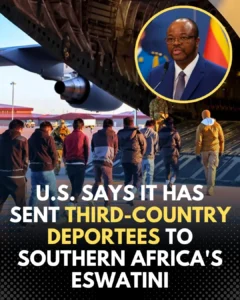
The United States has sent five foreign nationals to Eswatini, a small kingdom in Southern Africa, under its third-country deportation policy.
These individuals, originally from Vietnam, Jamaica, Cuba, Yemen, and Laos, had been convicted of serious crimes, including murder and child rape.
Their home countries refused to accept them, prompting the U.S. to seek alternative deportation destinations.
Eswatini has confirmed the deportations, stating the individuals are currently being held in isolated correctional facilities.
The U.S. Supreme Court recently upheld the Trump administration’s policy of deporting individuals to third-party countries.
Human rights groups have expressed concerns over the safety and legality of such deportations, especially due to Eswatini’s human rights record.
Eswatini’s government has assured that due process will be followed and that the deportees will eventually be repatriated with the help of the International Organization for Migration.
This move is part of a broader trend where the U.S. has previously deported individuals to countries like El Salvador and South Sudan under similar agreements.
While the U.S. government defends the policy, critics argue that it could put deportees at risk in countries with limited resources and security concerns.
The deportations are a significant development in the Trump administration’s immigration policies and could set a precedent for future cases.
As the situation unfolds, it raises important questions about the intersection of immigration enforcement and human rights.





